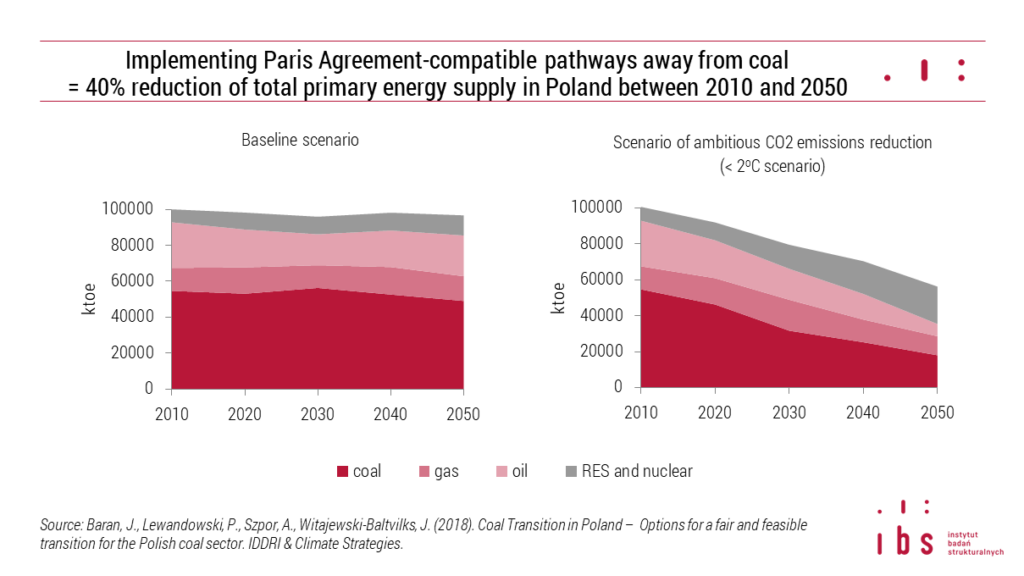Implementing Paris Agreement-compatible pathways away from coal is feasible in the major coal-using economies within 20 to 30 years, and would be beneficial both from a social and from an economic point of view – this is the main message from the report which summarizes the research provided within the project “Coal Transitions: Research and Dialogue on the Future of Coal“. The report has been published by French think tank IDDRI and UK-based research network Climate Strategies. Our Institute was responsible for the Polish case study.
Key findings
- Major coal-using economies can virtually phase out coal without significantly raising power costs for consumers, while reaping economic and social benefits from a transition into new industries;
- The peak and decline of global thermal coal, is approaching faster than previously shown: coal demand could go into reverse before 2025 (based on DIW Berlin model);
- Developing coal transition strategies is more urgent than ever because the underlying economics and societal preferences are turning against coal;
- Major exporting countries, such as Australia and South Africa, appear to be underprepared for the coming downturn in global coal demand;
- Even a 5-10% decline in domestic use of thermal coal in China alone – which would not be sufficient to meet the Paris Agreement – could wipe out up to a third of the global seaborne market for coal, thus depressing the price of coal on the international market.
Phase out of coal without significant costs for consumers
The aim of the research was to explore pathways for the future of thermal coal. Leading research institutes in six major coal-using countries analysed the mining sector in China, India, South Africa, Australia, Poland and Germany. They evaluate current policies and develop economically feasible and socially just pathways to phase out or phase down thermal coal before 2050, in line with the Paris Agreement.
Andrzej Błachowicz, Managing Director at Climate Strategies said:
just transition became such a buzzword, often with little content. Our reports prove that it can work in the limited available time. Just transition can allow for younger eligible workers to be more easily placed into alternative jobs, for older workers to retire naturally, and for tailored worker reconversion and job-transfer programs for workers in the middle of their careers.
Coal transition in Poland: energy demand and supply by 2050
Achieving an ambitious, three-fold reduction of CO2 emissions in Poland is feasible under the scenario of substantial (40%) reduction of energy demand. The scenario involves 44% reduction of coal use. Polish energy sector depends mostly on domestic coal production, hence coal transition would significantly reduce number of jobs in coal mining.
Jan Baran, Piotr Lewandowski, Aleksander Szpor and Jan Witajewski-Baltvilks from our Institute described the Polish case study. They presented two alternative scenarios:
- baseline scenario → between 2010 and 2050 the amount of CO2 emissions per capita will decline from 8.5 to 5.7 tones;
- ambitious 2-degrees scenario → the amount of CO2 emissions per capita will decline to 2.8 t by 2050.

The Polish case study includes labour market aspects of coal transition. The in-depth analysis based on the findings from the “Coal Transitions in Poland” report will be published in IBS Research Report at the end of September 2018.
Reports
- The summary report: Sartor, O. (2018). Implementing coal transitions: insights from case studies of major coal-consuming economies. IDDRI & Climate Strategies.
- The Polish report: Baran, J., Lewandowski, P., Szpor, A., Witajewski-Baltvilks, J. (2018). Coal Transition in Poland – Options for a fair and feasible transition for the Polish coal sector. IDDRI & Climate Strategies.
- The summary report and all six reports concerning China, India, Australia, South Africa, Germany and Poland are available at: https://coaltransitions.org/reports/.


